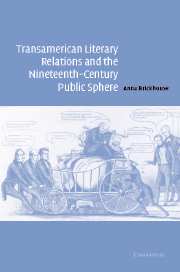Book contents
- Frontmatter
- Contents
- Acknowledgments
- Note on texts and translations
- Prologue
- 1 Introduction: transamerican renaissance
- 2 Scattered traditions: the transamerican genealogies of Jicoténcal
- 3 A francophone view of comparative American literature: Revue des Colonies and the translations of abolition
- 4 Cuban stories
- 5 Hawthorne's Mexican genealogies
- 6 Transamerican theatre: Pierre Faubert and L'Oncle Tom
- Epilogue
- Notes
- Index
Prologue
Published online by Cambridge University Press: 22 September 2009
- Frontmatter
- Contents
- Acknowledgments
- Note on texts and translations
- Prologue
- 1 Introduction: transamerican renaissance
- 2 Scattered traditions: the transamerican genealogies of Jicoténcal
- 3 A francophone view of comparative American literature: Revue des Colonies and the translations of abolition
- 4 Cuban stories
- 5 Hawthorne's Mexican genealogies
- 6 Transamerican theatre: Pierre Faubert and L'Oncle Tom
- Epilogue
- Notes
- Index
Summary
A great soldier and patriot, Simón Bolívar serves as an inspiration to all the peoples of the western hemisphere. Through turbulent and frustrating times, he had the vision to see that the unity of the Americas could be achieved … Bolívar's letter from Jamaica on September 6, 1815, poignantly expressed his dream of a union “with a single bond that unites its parts among themselves and to the whole.” With this aim in mind, he convoked the Congress of Panama in 1826, which signaled a decisive step toward the system of cooperation we enjoy today … On this occasion, we in the United States join with our hemispheric friends to remember the great hero whose ideals bind us closer together. Bolívar, more than any other figure in the history of the western hemisphere, understood that, while we are citizens of separate countries, we are members of one family in the new world – we are Americans.
So proclaimed Ronald Reagan when he designated July 24, 1983 through July 23, 1984 as the “Bicentennial Year of the Birth of Simón Bolívar, hero of the independence of the Americas.” From the perspective of nearly twenty years, of course, the proclamation is rife with political ironies, beginning with the US invasion of Grenada the following October and, some months later, the initiation of the Reagan administration's covert funding of the war in Nicaragua that would be revealed during the Iran-Contra scandal.
- Type
- Chapter
- Information
- Publisher: Cambridge University PressPrint publication year: 2004
- 1
- Cited by

